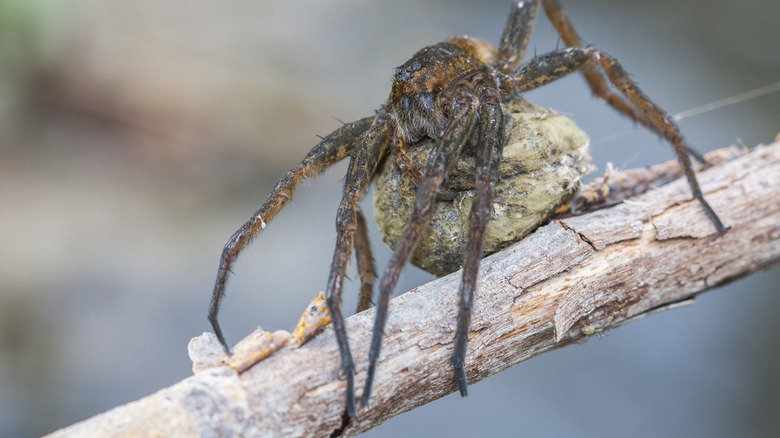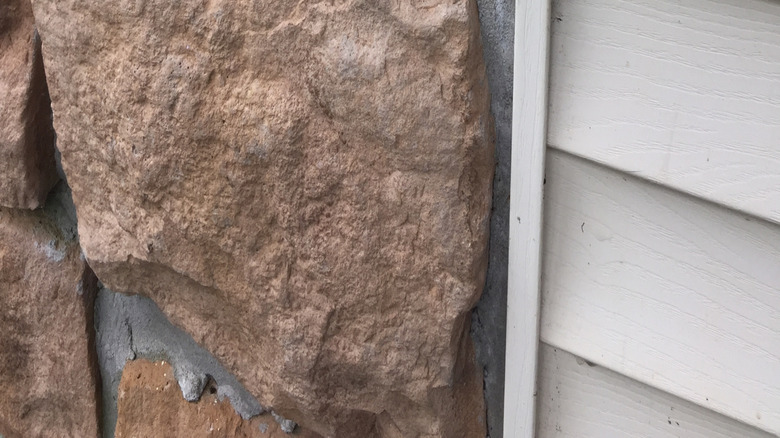3 Spiders That Are Attracted To Coastal Landscapes (And What You Can Do About It)
Even if you cried at the end of "Charlotte's Web," you may not want to see spiders in real life, especially at your beachfront home. While many spiders are content in dark, sneaky places, like closets and cabinets, some prefer lakes, rivers, and oceans. The beach wolf spider, dock spider, and sea spider are three arachnids enjoying the coastal beaches and waters.
The beach wolf spider lives throughout the United States and southern Canada. One female can produce over 100 babies in a green sac she carries on her back. Look closely to spot one since they don't spin webs and like to hide in the daytime, often in the sand or under driftwood. Due to their brown, mottled-gray, or white spotted bodies, they can easily camouflage into their hiding places.
Dock or "fishing" spiders mainly feast on insects, but they also try to catch fish, which they find by feeling for their vibrations in the water using their front two legs. However, if you live in an area with winter cold, these fuzzy bugs may take shelter in your home until the lakes melt.
When you take a dip, don't be surprised when you see some eight-legged friends there too. Living as deep as 2,300 feet below sea level, sea spiders come in 1,300 various species in oceans all over the world, according to the National Oceanic and Atmospheric Administration. Don't worry — they won't bite you when swimming, as they prefer coral and sea sponges for lunch.
Prevent coastal spiders in the home
Why would a spider that prefers the beach possibly come into your home? Don't worry, sea spiders won't ascend 2,300 feet from the sea to invade your property. However, if you have cold winters, dock spiders can't dig for fish in frozen waters, and along with wolf spiders, they need to go where the other prey is. Spiders need water, shelter, and food, which your home can provide.
Consider how your overall living situation by the beach and regional weather can contribute to spiders turning your home into their winter Airbnb. Prevent spiders from entering your home by sealing up cracks.
If you start seeing more spiders in winter, it is likely because you are giving them lots to feed on — namely other bugs. Spiders will prey upon beetles, mosquitos, flies, moths, ants, and even smaller spider species. Keep your home bug-free in winter by cleaning up crumbs and clutter that can be attractive for various bugs to nest in. Take care of plumbing leaks and clogged gutters, which attract mosquitoes and ants, and in turn, the spiders hunting for them. If your beach home is a vacation spot, check in or have someone do so periodically.
Repel coastal spiders with plants
If you are worried about chemicals from professional pest control, there are instead natural ways to ward off a spider invasion. Use your green thumb to maintain plants that keep spiders away. While eucalyptus, peppermint, and lavender create alluring smells for humans, they often repel spiders due to their strong scents. It's best to propagate lavender in summer while always providing sun and well-drained soil. Certain types, like Spanish and French lavender, should be brought indoors in winter. Enjoy growing peppermint all year indoors or in your garden. Eucalyptus is best grown in your garden but can survive indoors with care that includes proper sunlight.
Create a perimeter of these plants outside the home, or strategically place pots near vents, windows, and doors where spiders may enter. Test your DIY spraying skills by combining oils from the above plants, water, and Solubol (a dispersant) in a spray bottle, and use it where you see the critters. Are you going to be away from the beach house for a while and unable water plants? Create a potpourri from these dried leaves and place it in sachets around the home.
In most cases, these beach spiders prefer to be by the sand and water, but they can seek other shelter if cold weather creeps into your area. Be proactive in not making your home a haven for the insects they prey on by making home repairs before winter, cleaning up, and planting some strongly scented herbs.


